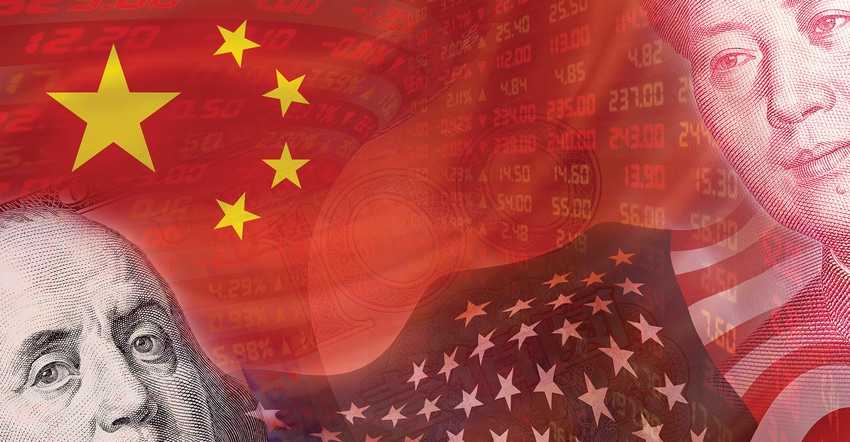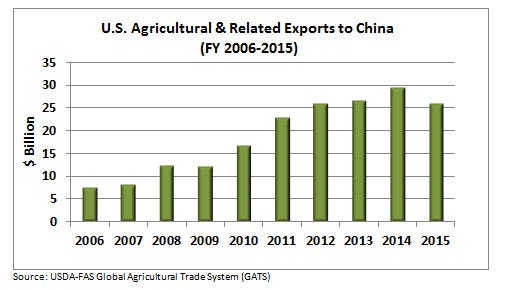
No one wants a trade war, especially with China. But with a new sheriff in town, President Donald Trump looks like he’s filling his arsenal to keep the focus on the Far East.
U.S. agricultural exports to China have grown more than 200% over the past decade, and China was the United States’ second-largest international market in 2015. U.S. farm and food exports to China totaled more than $20.2 billion in 2015, led by soybeans, coarse grains, distillers grain, hides and skins, and cotton.
Agricultural trade between China and the U.S. grew to $35.6 billion last year, and predictions are the nation could see $71.2 billion in trade with China by 2025, if forecasts hold.

China has garnered much attention in recent trade challenges, and under Trump the scrutiny will likely increase.
The Obama administration brought 15 trade enforcement challenges against China, with the latest action filing a World Trade Organization case challenging the country’s estimated $100 billion in excess price supports for rice, wheat and corn. In December, the U.S. Trade Representative filed another related action regarding China’s administration of its tariff-rate quotas (TRQs) for rice, wheat and corn.
“Although China has become a significant market for our grain exports, we could be doing much better than we are today,” said USDA Secretary Tom Vilsack at the time of the second case’s filing in December. “When China joined the WTO, it committed to implementing an agriculture regime that would facilitate market access consistent with international obligations. However, China has frustrated exporters through generous price support and unjustified market restrictions.
“Taking action against grain price supports was one piece of the puzzle, and now we must confront China’s improper administration of its TRQs to ensure that our grains have the meaningful market access that China bound itself to as a member of the WTO.”
Add in an ongoing WTO dispute over poultry exports regarding phytosanitary issues, China’s BSE beef ban and its biotechnology regulatory approvals, and farmers may be wondering if China ever will play by the established WTO rules.
Stage is Set
Many of Trump’s trade advisers, including Ambassador Robert Lighthizer as his pick for U.S. Trade Representative, share the view that the United States in recent decades prioritized the ideal of free trade over its own self-interest. And the U.S. economy has paid the price.
During the campaign, Trump promised to label China a currency manipulator, meaning it keeps the yuan artificially low to make its exports cheap, and has threatened to impose punitive tariffs on Chinese goods coming into the United States. And Trump’s trade advisers look to continue to take a hard-line approach to solving trade woes.
When serving as deputy U.S. Trade Representative, Lighthizer played a major role in developing trade policy for the Reagan administration and negotiating roughly two dozen bilateral international agreements on a variety of topics from steel to grain. In recent years Lighthizer has taken a strong enforcement role in defending against unfair trade practices, as he led the international trade law practice at Skadden, Arps Slate, Meagher.
Although President Ronald Reagan is often remembered as an advocate for free trade, in the early days of his administration, he also imposed a quota on Japanese auto imports. Looking back, this was the first in a long series of measures aimed at putting pressure on the nation that was then regarded, like China in recent years, as a threat to American prosperity.
There is some skepticism by Republicans on Trump’s protectionist views. Economist Peter Navarro, an outspoken critic of China, has been named to lead a new White House office overseeing trade and industrial policy. Secretary of Commerce nominee Wilbur Ross will play a key role in trade policy, despite many comments and actions over the years showing he has a mixed view on the level of currency manipulation China actually is engaged in.
Everyone needs friends in tough negotiations, and Trump put his best card on the table for agriculture when naming Iowa Gov. Terry Branstad as his ambassador to China.
Branstad has a 30-year history with the current president of China, Xi Jinping. The relationship between Branstad and Xi dates back to 1985, when Xi visited Iowa to study agriculture as a young man as a Hebei province party official and was the director of the Feed Association of Shijiazhuang Prefecture. Branstad is considered an “old friend,” a culturally significant title, by Xi.
Branstad said the U.S.-China bilateral relationship is at a critical point. As the longest-serving governor in Iowa, he has led six trade missions to China during his time as governor and understands that over 25% of U.S. agriculture production goes to China, as well as 60% of U.S. soy exports.
American Soybean Association President Richard Wilkins said Branstad has been an ally in understanding the huge impact of U.S. agriculture in global trade. “He clearly understands the global nature of the agricultural economy, and knows what American farmers and Chinese buyers mean to one another,” Wilkins says.
Follow the rules
China entered the WTO 15 years ago, but has had a lot of adjustments to make to follow the rules laid out by the WTO.
David Salmonsen, American Farm Bureau Federation senior director of congressional relations, says U.S. farmers want to keep China as a big market for U.S. goods. “You don’t have problems with countries you don’t play with,” he says.
Salmonsen notes that China is undergoing several changes internally. It is also adjusting from double-digit growth shrinking to single-digit growth.
Craig Thorn, partner at DTB Associates and an ag trade guru, says he admires China for taking on the obligations, and he considers the country to be a responsible part of the system that wants to see trade work.
“On the other hand, they’ve tried to get away with a lot,” Thorn says. “It doesn’t mean they’re ignoring all of their obligations, just that it’s important for the U.S. to call them on problems where they exist.”
The WTO case filed against subsidies and support for Chinese corn, wheat and rice deemed excessive has displaced imports by artificially increasing domestic production in China.
Thorn says those price supports were essentially at a level of $10 per bushel for corn.
Despite the failed Doha Round within the WTO, Thorn says that the WTO-complaint structure still allows WTO rules to be relevant and “bring order to the trading system.”
And that’s where the two-way trade relationship comes in. So far China has not abided by WTO rulings in a poultry case, and biotechnology concerns continue to lag. The goal is never to go into dispute settlings hoping for retaliation, and the same goes for the latest cases against China.
Thorn does not correlate the massive WTO case against China as filing divorce papers. “We’re still going to have a productive and beneficial relationship with China,” he says, even if it made some in China mad. “China has shown a lot of maturity as members of the WTO. I think we can work through the issues.
“For all the violations we see in China, there are dozens of other obligations that they implemented without a problem,” Thorn says. “In general, WTO membership has been a good thing for China and its trading partners to address problems when they arise.”
About the Author(s)
You May Also Like






